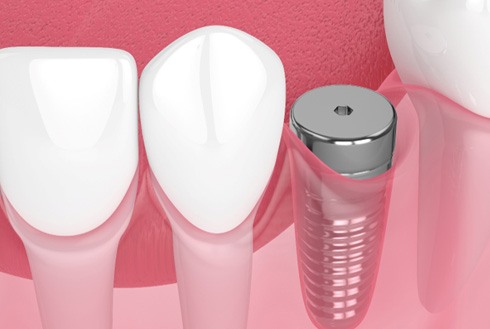Our Westerville dental office is in the same general location as the Westerville Community Center, on County Line Rd W between Africa Rd and N Cleveland Ave. We’re also less than five minutes west of N State Street.
Dental Implants – Westerville, OH
Fully Replace Your Missing Teeth

What makes dental implants such an appealing tooth replacement option for an ever-growing number of people? It largely lies in the fact that, unlike traditional bridges and dentures, dental implants are able to act as new tooth roots, which is good news for your smile and your overall quality of life. To many people, dental implants in Westerville are the next best thing to getting their real teeth back. Call to set up a consultation at Tzagournis Dental Group of Westerville if you’re interested in this modern solution for an incomplete smile.
Why Choose Tzagournis Dental Group of Westerville for Dental Implants?
- Dental Implants Placed In-Office
- The Latest Dental Technology
- Relaxing Sedation for Nervous Patients
What Are Dental Implants?

There are three main parts to a dental implant: the post, the abutment, and the restoration. The post is the part that interfaces with your jaw; it can join with the bone, effectively making it part of your body. An abutment is a special metal connector piece that can be attached to the post. The final restoration is the part that resembles your natural teeth, and it is anchored to an appropriate number of implant posts via the abutment(s). This unique approach results in new teeth that look and feel natural.
The 4-Step Dental Implant Process

Unlike dentures and dental bridges, dental implants require a multi-step process that takes several months to complete. This might seem like a long time, but their long-term benefits are well worth the wait. At Tzagournis Dental Group of Westerville, we are happy to complete the entire dental implant treatment process in our practice, so you don’t need to worry about working with an outside specialist at another location. Every patient’s treatment looks a little bit different, but here are the four main steps that you can expect.
Initial Dental Implant Consultation

As your first step of the dental implant process, you’ll come to our office for a consultation so that we can make sure that you are a good candidate for dental implants. Depending on your treatment plan, certain preliminary procedures may need to be performed before you can get dental implants. Then, we can move on to planning the rest of your treatment. We will walk you through what you can expect step-by-step, including timeline and cost.
Dental Implant Surgery

We complete the entire dental implant process in our practice, so we won’t need to refer you elsewhere. The procedure will begin by numbing the area with a local anesthetic so that you don’t feel a thing. We also offer a variety of sedation options to help make your treatment even more comfortable. Then, an incision is made in the gums so the implant posts can be placed in the jawbone. Lastly, the gums are closed, and protective caps are placed over the posts so they can heal.
Dental Implant Osseointegration & Abutment Placement

Your implant posts will gradually fuse with your jawbone after a few months. This process is known as osseointegration. After this takes place, there will be another small procedure in which abutments are placed on the posts of your implants. Impressions are taken of your mouth, and your final restoration will be crafted to fit perfectly in your mouth.
Delivery of Dental Implant Restorations

Lastly, you will return to our practice to have your restoration placed. During this visit, we will check to ensure that your bite is comfortable. Then, you will be ready to head out into the world with your re-completed grin!
Benefits of Dental Implants

Dental implants are the only form of tooth replacement that can stop bone loss due to mimicking the stimulation normally provided by your tooth roots. Furthermore, your teeth won’t slip out of place at awkward moments, and they’ll be strong enough to handle a wide variety of foods. Caring for dental implants isn’t much different than caring for your natural teeth. As long as you make good decisions for your smile, your dental implants will likely be able to last for decades.
We can go into more detail about the advantages of dental implants during your initial consultation. Let us show you what makes this procedure a top choice for tooth replacement.
Day-to-Day Benefits

- Simple Care Routine: Unlike traditional restorations or prosthetics, like dental bridges and dentures, dental implants will simply need to be taken care of just like your natural pearly whites. Make sure to brush, floss, and rinse with mouthwash every day as well as visit your dentist every six months to make the most of your rebuilt smile.
- Expanded Diet: Since you’ll regain 80% or more of your natural chewing power, you’ll be free to enjoy a wider range of dietary choices, including nutritional foods that can promote better oral and overall health.
- Improved Confidence: By rebuilding missing teeth from the roots up, you won’t have to worry about your restorations shifting out of place while eating or talking. With reliable results, you’ll be able to show off a smile that you can be proud of, increasing your confidence in the process.
Health Benefits

- Prevent Jawbone Deterioration: By embedding dental implants into your jawbone, they’ll be able to help stimulate proper bone growth, creating a more stable foundation for your new teeth and preventing the jaw from shrinking over time due to tooth loss. Not only will this promote a stronger jaw, but it’ll also allow you to maintain a more youthful facial appearance.
- Tooth Preservation: Dental bridges and partial dentures typically use nearby natural teeth to support them. This can end up putting your remaining pearly whites at risk of complications like damage, decay, or even extraction later on. However, dental implants are self-supporting, so you won’t have to worry about your other natural teeth.
Long-Term Benefits

- Long-Lasting Solution: While traditional restorations often last around 10 years before needing to be replaced, dental implants can often go for multiple decades to even the rest of your life depending on how well you take care of them. They also typically come with a success rate of over 95% even 10 years after being placed!
- Cost-Effective Method: Although dental implants come with a higher upfront price, they won’t require replacements as often or special products to maintain them. This means you can actually save more money in the long run.
Who Dental Implants Can Help

Are you an adult? Have you lost one or more teeth? Is your mouth healthy in general? Is there plenty of bone in your jaw? If your answer to all of these questions is yes, there’s a very good chance that you can have dental implants placed. (Remember, certain issues like a lack of jawbone density can be corrected with preliminary treatments.) Keep in mind that the dental implant process looks different for every patient based on the extent of tooth loss. Here’s how dental implants can help in a variety of tooth loss situations.
Missing One Tooth

When you’ve lost a single tooth, we don’t necessarily need to make permanent alterations to your remaining teeth to make room for a bridge. Instead, we can insert an implant post in the area where the tooth used to be and – once your mouth is done healing – restore it with a dental crown that blends right in with the rest of your smile.
Missing Multiple Teeth

Did you know that a dental bridge can be supported by a pair of dental implant posts instead of your natural teeth? This can be an excellent option if at least three consecutive teeth are missing in your smile. The bridge will completely fill the empty space so that your remaining teeth don’t drift, and the expertly placed implant posts will keep your prosthesis stable.
Missing All of Your Teeth

Full dentures that have been attached to dental implant posts tend to be more stable than those that sit directly on the gums. To get a full implant denture, you’ll typically need to have four or more dental implants placed in your upper or lower arch. Some implant dentures are removable, but others are fixed and can only be taken out of your mouth by your dentist.
Understanding the Cost of Dental Implants

Dental implants are a highly personalized solution for extensive tooth loss, making their pricing vary based on each case. At Tzagournis Dental Group, we’ll ensure you thoroughly understand the implant process and the key cost factors involved. Regardless of the treatment cost, you can expect this method of tooth replacement to stand out as one of the most cost-effective in dentistry. To schedule your next dental implant consultation, simply give us a call!
Preliminary Treatments & Dental Implant Surgery

If preliminary treatments (i.e., bone grafts, tooth extractions, gum disease treatment) are required before your dental implant procedure, they will naturally contribute to the overall cost of rebuilding your smile.
Additionally, the surgery itself, along with any sedation required, will have its own associated expenses. It's worth noting that our team will conduct your implant surgery in-house, eliminating the need for additional time to consult with an outside specialist.
The Parts of Your Dental Implant

You'll need to factor in the cost of the dental implant itself, which includes:
- Number of dental implants. The more implants required, the greater the overall cost.
- Type of restoration. The expense varies between replacing a single tooth with a crown versus replacing all teeth with a full implant denture. However, opting for an implant denture for multiple teeth tends to be more cost-effective than individual replacements.
- Size or material. Dental implants come in various sizes and materials like titanium or zirconia, each influencing the treatment cost.
- Brand of dental implants. We prioritize high-quality materials and reputable brands for dental implants. Remember, quality matters when it comes to long-term tooth replacement. If you're curious about the specific brand of dental implant selected for you, don't hesitate to ask!
How Dental Implants Can Save You Money

While initially pricier, dental implants offer superior comfort and functionality, enhancing overall health and confidence. They’ll save you money long-term, lasting a lifetime without replacements or repairs. Dental implants also promote better oral health and prevent jawbone deterioration, leading to less oral health expenses over time.
Does My Dental Insurance Cover Dental Implants?

Most dental insurance plans offer limited coverage for dental implant treatment. However, coverage varies by policy, and we're here to assist you in reviewing yours. Usually, insurance companies cover portions of treatment like consultations, sedation, or restorations. Our skilled team will handle claim filing to ensure you maximize your benefits.
Making Dental Implants Affordable

Don’t have dental insurance or are you unsatisfied with coverage? No problem! Your smile's health is our priority. You can sign up for our in-house dental plan and enjoy sizeable discounts on all services. We’ll make sure your care fits seamlessly into your budget!
Maintaining & Caring for Your Dental Implants

Dental implants are made to last for a very long time. Some patients never have to worry about their missing teeth again. However, to benefit from your dental implants for a long time, it’s crucial that you take all of the proper steps to care for them. Continue reading to learn about some good measures and healthy habits to implement for the sake of your smile.
Make Oral Hygiene a Priority

Your dental implants cannot get cavities, but your surrounding teeth still can. You are also still at risk for gum disease. To keep your smile in good shape You should continue to maintain an excellent oral hygiene routine. This means brushing twice, flossing, and risking with mouthwash every single day.
Eat a Healthy Diet

One of the amazing benefits of dental implants is the fact that patients can enjoy a complete, nutritious diet. This is something that you should take advantage of! Just keep in mind that it is still a good idea to avoid indulging in hard, sticky, or sugary items. You should enjoy plenty of foods that contain calcium and vitamin C. These nutrients help to keep your jawbone and gums in good shape.
Break Bad Habits

Bad habits can cause issues for your dental implants and natural teeth. It is always best to refrain from smoking cigarettes and using other tobacco products. These can slow healing and make it more difficult for your body to fight off infections. You should also avoid using your teeth as tools. Instead, look for scissors, a bottle opener, pliers, or another item that can help you safely complete your task.
Protect Your Dental Implants

Dental implants are very strong, but they aren’t indestructible. You should always wear a mouthguard to protect your dental implants during contact sports. If you have a tendency to grind your teeth at night, you should ask your dentist about getting a nightguard so you can protect your replacement teeth (and natural teeth) from additional wear and tear.
Schedule Regular Dental Checkups

You should continue to attend regular cleanings and checkups every six months. This way, we can monitor your dental implants, natural teeth, gum tissue, and more. By finding problems early on, we can address them quickly and might be able to prevent serious complications from arising later on.
Dental Implant FAQs
Does Getting Dental Implants Hurt?
Before having your dental implants placed in your mouth, we’ll use local anesthetic to numb the area completely. This is a fairly easy process, as the jawbone happens to lack nerve endings anyway. This being the case, you’re unlikely to feel anything for the duration of your dental implant procedure.
After the treatment, it’s common to feel a little bit tender for a few days. Make good use of cold compresses and take prescribed medication as directed in order to stay as comfortable as possible during aftercare.
What Should I Do If My Dental Implant Feels Loose?
If you notice that your dental implant is loose, this is a sign of impending failure. It may be the case that your implant never fused properly with your jawbone, or that infection has degraded the jaw substantially.
We may be able to save your dental implant if you act fast, so be sure to contact us as soon as you notice that your dental implant has started to come loose.
Am I Too Old to Get Dental Implants?
Seniors sometimes worry that they’re too old for dental implant surgery, and that they are stuck with less invasive tooth replacement options. However, studies show that older patients have the same success rate as anyone, all else being equal.
The only concern is that seniors tend to have more oral health problems than younger people, which increases their risk of complications. For that reason, we’ll be sure to examine you thoroughly to make sure that you’re in good condition before beginning the treatment.
Can I Get Dental Implants If I Smoke?
While smoking and tobacco use don’t make getting dental implants impossible, they do increase your risk of complications. Nicotine restricts blood flow to the mouth, which impairs the ability for the dental implant to fuse with the jaw. The act of smoking also creates a fair amount of suction, which can lead to dry socket.
For these reasons, we would recommend that smokers quit for a while around the time of the implant procedure, two weeks before and for at least two months afterward.




